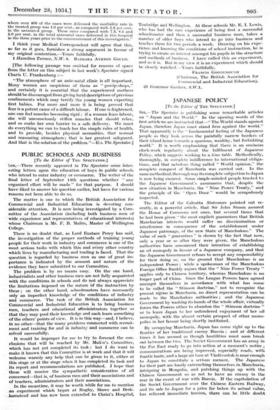PUBLIC SCHOOLS AND BUSINESS [To the Editor of THE SPECTATOR.]
bni,—There recently appeared in The Spectator some inter- esting letters upon the education of boys in public schools who intend to enter industry or commerce. The writer of the final letter of September 14th questions whether " any organized effort will be made " for that purpose. I should have liked to answer his question earlier, but have for various reasons not been able to do so.
The matter is one to which the British Association for Commercial' and Industrial Education is devoting con- siderable attention. It is now being investigated by a Com- mittee of the Association (including both business men of wide experience and representatives of educational interests) whose Chairman is Mr. F. B. Maim, Master of Wellington College.
There is no doubt that, as Lord Eustace Percy has said, the investigation of the proper methods of training young people for their work in industry and commerce is one of the most serious tasks with which this and every other country which lives by manufacturing and trading is faced. That the question is regarded by business men as one of great im- portance is 'indicated by the amount and nature of the evidence they have submitted to our Committee.
' The problem is by no means easy. On the one hand, industrialists and other business men are not fully acquainted with the conditions in schools and do not always appreciate the limitations imposed on the nature '6f the instruction by these ; on the other hand; schoolmasters have necessarily only an imperfect knowledge of the conditions of industry and commerce. The task of the British Association for Cominercial and Industrial Education is to bring business men, teachers and educational administrators together so that they may pool their knowledge and each learn something of the others' points of view. It is in this way—and, I believe, in no other—that the many problems connected with recruit- ment and training for and in industry and commerce can be solved successfully.
It would be improper for me to try to forecast the con- clusions that will be reached by Mr. Mafia's Committee, which has not yet completed its task : but I do want to make it known that this Committee is at work and that it will welcome warmly any help that can be given to it, either at this stage or at the stage when it has completed its task and its report and recommendations are published. I hope that these will receive the sympathetic consideration of all concerned—that is, of business men and their associations and of teachers, administrators and their associations.
In the meantime, it may be worth while for me to mention an experiment which began at Rugby, Stowe and Berk- hainstead and has now been extended to Christ's Hospital, Tonbridge and Wellington. At these schools Mr. E. I. Lewis, who has had the rare experience of being first a successful schoolmaster and then a successful business man, takes a number of older boys who intend to go into business and teaches them for two periods a week. Drawing on his expe- rience and knowing the conditions of school instruction, he is trying to create an interest amongst his pupils in the structure and methods of business. I have' called this an experiment, and so it is. But in my view it is an experiment which should be closely watched.—Yours faithfully, FRANCIS GOODHNOCGII (Chairman, The British Association for Commercial and Industrial Education). 28 Grosvenor Gardens, S.11'.1.


































 Previous page
Previous page